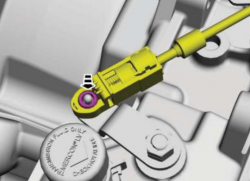
— A Ford shifter bushing recall convinced a federal judge to dismiss a class action lawsuit that alleges Ford shifter cable bushings wear out and detach.
New York plaintiff Sergio Diaz and Illinois plaintiff Retha Connors filed the lawsuit for more than $5 million, yet neither Ford owner alleges their vehicle had any problems with the shifter bushings.
In addition, the plaintiffs do not claim they took their vehicles to Ford dealers for inspections.
Plaintiff Diaz owns a 2017 Escape and Conners owns a 2014 Escape. Both vehicles are equipped with allegedly defective shift cable bushings. These components connect the transmission to the gear shifter.
But the shifter bushing can degrade and detach, allowing a vehicle to roll away if the emergency brake isn't engaged.
According to the Ford class action, the defective shifter bushing is the Hilex (Hytrel 4556).
Ford issued a shifter bushing recall of 2013-2014 Ford Escape and 2013-2016 Ford Fusion vehicles in 2018. Since then, Ford has issued additional recalls with the most recent shift bushing recall announced in June 2022.
The Ford shift cable bushing recalls included these vehicles:
- 2013-2019 Ford Escape
- 2013-2016 Ford Fusion
- 2013-2018 Ford C-Max
- 2013-2021 Ford Transit Connect
- 2015-2018 Ford Edge
The 2018 recall said Fusion and Escape vehicles had shifter bushings which contained a contaminant that caused the bushings to wear out.
By the 2022 recall, Ford said the root cause of the problem was still unknown, but engineers believed heat and humidity caused the bushing to break down.
Ford has offered to replace the bushings with “shift bushings [that] are manufactured from a different grade material with a heat stabilizer. Additionally, a cap will be installed over the shift bushing for protection against contaminants.”
Additionally, owners who paid their own money for repairs would be reimbursed.
Ford Shifter Bushing Class Action Lawsuit Dismissed
According to the plaintiffs, “Ford does not know whether the cap fixes the Bushing Defect, and, on information and belief, the replacement bushings do not remedy the Bushing Defect. Indeed, owners have reported that the replacement bushings disintegrated within three years.”
Ford argued the plaintiffs failed to allege an injury because the bushings in their vehicles did not have any problems. But Judge George Caram Steeh said the vehicles no not need to have defective bushings to establish an injury.
"Plaintiffs allege that Ford concealed the defect, which diminished the value of their vehicles, and had they known their vehicles contained a defective part they would have paid less or not purchased them at all." — Judge Steeh
But the judge also noted Ford offered to replace the defective bushings with new bushings made of a different material. The automaker also offered to reimburse owners for out-of-pocket expenses.
Because of the actions provided by the shifter bushing recall and because the vehicles owned by the plaintiffs had no bushing problems, the judge ruled In light of the availability of this remedy, and the fact that the defect has not manifested in their vehicles, it is not clear how the plaintiffs have been injured.
“A named plaintiff must allege facts showing that he or she personally suffered economic loss as a result of an inadequate recall to state a cognizable injury on the basis of a recalled product. Although Plaintiffs contend that they were injured by overpaying for their vehicles at the point of sale, they do not plausibly allege that such diminished value will persist after the defective bushings are replaced by Ford." — Judge Steeh
The plaintiffs failed to provide facts to support the claim the new shifter bushings are prone to degrading. And the assertion the vehicles will be defective after the recall repairs "is conclusory and speculative."
The Ford shifter bushing lawsuit was dismissed because the plaintiffs failed to contend they suffered an injury in fact.
The Ford shifter bushing lawsuit was filed in the U.S. District Court for the Eastern District of Michigan: Sergio Diaz, et al., v. Ford Motor Company.
The plaintiffs are represented by the Miller Law Firm, and Fegan Scott LLC.




